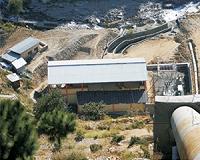 |
Munich, Germany (SPX) Aug 19, 2010 Starting 2011, energy suppliers will be obligated to offer variable power prices. A new energy management software platform will enable customers in future to opt for flexible electricity rates, so that they can purchase power at times when it is available more cheaply.A further advantage is better utilization of the power grid. Faced with rising electricity and heating costs, more and more consumers are opting to save energy, and now the government is beginning to help them. As from 2011, energy suppliers will be required to offer electricity at variable rates under the German Energy Act (EnWG � 40,3). The idea behind the new law is simple: variable rates should encourage people to make a conscious effort to control their consumption. This is where the new open software platform will come into its own in future, helping electricity consumers to handle the new fl exible rates and make their energy consumption more intelligent. The OGEMA (Open Gateway Energy Management Alliance) Framework was developed by the Fraunhofer Institute for Wind Energy and Energy System Technologies IWES in Kassel. It is a freely available Java-based, opensource platform for energy management that links both consumers and producers of energy to the control centers of the grid operators and power suppliers. Via a display, customers will be able to monitor a variable electricity price and wait for times when rates are lower in order to start their dishwashers for instance. "Variable rates allow demand for electricity to be steered. When grid utilization levels are low, electricity can be offered at lower rates. This makes it lucrative, for example, for consumers to run their washing machines at night. Flexible pricing is an incentive to gradually shift power consumption to times when there is an oversupply of wind energy. After all, with the growing trend towards to renewable energy sources it is becoming ever more important to adapt one's consumption to suit the supply." That is how Dr. Philipp Strauss, engineer and division director at IWES, explains the concept behind the software. But nobody really wants to spend time checking up on electricity prices several times a day, which is why the researchers responsible for the OGEMA Framework developed a software program called BEMI (Bidirectional Energy Management Interface) that relieves consumers of this very task. The software automatically controls appliances such as refrigerators, washing machines, heat pumps and air-conditioning. But OGEMA programming is not just the domain of the researchers: True to the principle of other open-source projects such as Linux, all developers are free to design software for the platform, thus implementing their ideas for the automated and more effi cient use of energy. Currently, there is no open system for the home automation fi eld that enables different manufacturers to develop dedicated apps," says Dr. David Nestle, IWES group manager, underlining the special feature of the OGEMA Framework. In order to continue developing the concept and making it better known, the IWES launched the OGEMA Alliance this summer, which a number of companies, such as Mannheim-based energy supplier MVV and solar energy wholesaler Entrason, have already joined. "Our hope is that, within a short space of time, numerous applications will arise to meet the needs of private households and small businesses", says Nestle. One conceivable innovation is an app that adapts the operation of electrical appliances to the power generation pattern of a household's own photovoltaic system or that coordinates individual room heating to suit the consumer's daily routine. At the moment, researchers are working on the fi rst version of the OGEMA-software, which will be available later this year as a gratis download: An fi eld test will be carried out as part of the E-energy projects "Modellstadt Mannheim" and the EU-sponsored SmartHouse/SmartGrid. Initially, the use of the system will be tested in 100 households, with a further fi eld test involving 1500 customers planned for next year.
Share This Article With Planet Earth
Related Links Fraunhofer-Gesellschaft Powering The World in the 21st Century at Energy-Daily.com
 New Method For Estimating Cost Of Small Hydropower Projects
New Method For Estimating Cost Of Small Hydropower ProjectsCollege Park MD (SPX) Aug 19, 2010 In developing countries such as India, small hydroelectric power (SHP) projects represent a potentially large but largely untapped source of energy, primarily because the cost of constructing the sites is thought to be higher per kilowatt of generated power than the cost of large plants. But is it? To find out, Sunil Singal, Senior Scientific Officer at the Indian Institute of Technology i ... read more |
|
| The content herein, unless otherwise known to be public domain, are Copyright 1995-2010 - SpaceDaily. AFP and UPI Wire Stories are copyright Agence France-Presse and United Press International. ESA Portal Reports are copyright European Space Agency. All NASA sourced material is public domain. Additional copyrights may apply in whole or part to other bona fide parties. Advertising does not imply endorsement,agreement or approval of any opinions, statements or information provided by SpaceDaily on any Web page published or hosted by SpaceDaily. Privacy Statement |